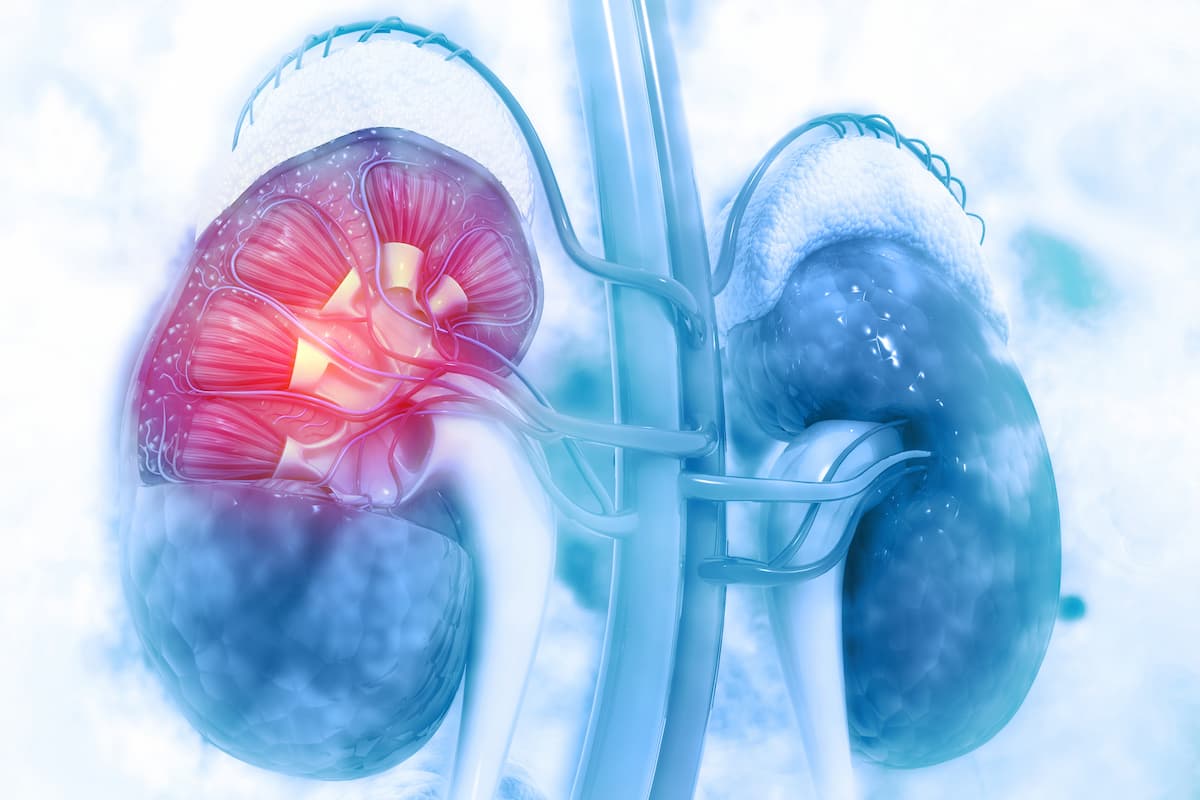Pembrolizumab Prolongs Survival in Clear-Cell RCC
Pembrolizumab also demonstrated a disease-free survival benefit vs placebo for patients with clear-cell renal cell carcinoma.
The safety findings from the phase 3 KEYNOTE-564 trial (NCT03142334) remained consistent with those previously reported.

A significant and clinically meaningful improvement in overall survival (OS) was observed with pembrolizumab (Keytruda) compared with placebo for patients with clear-cell renal cell carcinoma who may be at risk of recurrence post-surgery, according to results from the final analysis of the phase 3 KEYNOTE-564 trial (NCT03142334).
A significant OS improvement with pembrolizumab was noted across the overall population (HR, 0.62; 95% CI, 0.44-0.87; P = .005). At 48 months, the estimated OS rate was 91.2% (95% CI, 88.3%-93.4%) for pembrolizumab vs 86.0% (95% CI, 82.6%-88.8%) for placebo.
“[KEYNOTE-564] with its [OS] benefit, establishes 1 year of pembrolizumab as the standard practice in intermediate-high, high, and [metastasis in a different organ with no evidence of disease] clear-cell renal cancer. Patients and physicians have waited over 50 years for these results. This will open more options to extended survival for our patients,” Toni K. Choueiri, MD, director of the Lank Center for Genitourinary Oncology at Dana-Farber Cancer Institute, stated in a written statement to CancerNetwork®.
A total of 994 patients were randomly assigned to either adjuvant pembrolizumab (n = 496) or the placebo arm (n = 498). The median time from randomization to data cutoff was 57.2 months. The median duration of the trial regimen was 11.1 months in the pembrolizumab and placebo groups, and the median number of pembrolizumab doses was 17. By December 2020, all patients had completed or discontinued treatment.
Overall, 55 patients in the pembrolizumab arm and 86 in the placebo arm died. In the pembrolizumab group, the estimated percentage of patients alive in the pembrolizumab group at 24 months was 96.3% (95% CI, 94.2%-97.7%), and at 36 months it was 93.9% (95% CI, 91.4%-95.7%). Corresponding rates in the placebo group included 93.9% (95% CI, 91.4%-95.7%) at 24 months and 89.5% (95% CI, 86.4%-91.9%) at 36 months.
Disease recurrence or death occurred in 174 patients from the pembrolizumab group and in 224 patients from the placebo group. In the pembrolizumab group, the percentage of those who were alive and free from recurrence was 78.2% (95% CI, 74.2%-81.6%) at 24 months, 72.4% (95% CI, 68.1%-76.2%) at 36 months, and at 48 months it was 64.9% (95% CI, 60.3%-69.1%). In the placebo arm, rates included 67.2% (95% CI, 62.8%-71.1%) at 24 months, 62.9% (95% CI, 58.5%-67.0%) at 36 months, and 56.6% (95% CI, 52.0%-60.9%) at 48 months. The HR for disease recurrence or death was 0.72 (95% CI, 0.59-0.87).
Local recurrence occurred in 15.5% of patients in the pembrolizumab arm, and 88.8% had distant recurrence. Of note, 79.5% of patients in the pembrolizumab group and 81.4% in the placebo group received subsequent therapy. Additionally, 4 patients in the pembrolizumab arm and 1 in the placebo arm had subsequent treatment but no documented recurrence.
Systemic anticancer therapy was given to 79.5% of patients in the pembrolizumab arm and 84.3% in the placebo arm, with 24.2% vs 19.8% receiving radiation, and 27.3% vs 29.1% receiving additional surgery. Anti-PD-1 or PD-L1 therapy was given to 41.0% vs 69.7% of patients who were given subsequent therapy in both arms. For those who were given systemic therapy, the rates of patients who received VEGF- or VEGFR-targeted therapy were 92.4% in the pembrolizumab group and 84.8% in the placebo group.
The safety findings remained consistent with those previously reported. Adverse effects (AEs) of any cause that led to discontinuation of treatment occurred in 21.1% of patients in the pembrolizumab group vs 2.2% in the placebo group. Serious AEs also occurred in 20.7% of patients in the pembrolizumab arm and 11.5% in the placebo arm, with grade 3/4 toxicity occurring in 18.6% vs 1.2%.
Overall, no deaths related to pembrolizumab occurred. Treatment-related serious AEs occurred in 10 patients in the pembrolizumab arm 90 days after discontinuation of treatment.
Immune-mediated AEs and infusion reactions were observed in 36.5% of patients in the pembrolizumab arm and 7.3% in the placebo arm. The median time to onset of these AEs was 2.1 months and 4.9 months, with the median duration being 2.9 months and 1.4 months, respectively.
Reference
Choueiri TK, Tomczak P, Park SH, et al. Overall survival with adjuvant pembrolizumab in renal-cell carcinoma. N Engl J Med. 2024;390(15):1359-1371. doi:10.1056/NEJMoa2312695
Newsletter
Stay up to date on recent advances in the multidisciplinary approach to cancer.